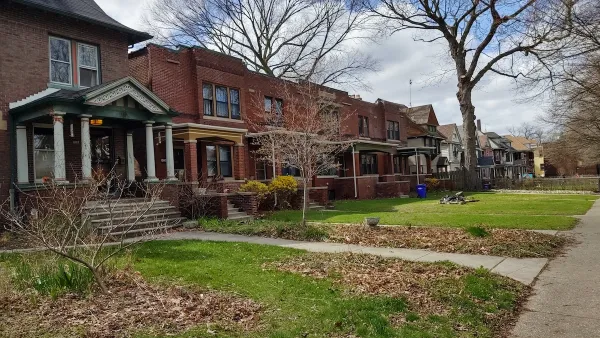Sara Robinson explains how the historical view of American homeownership -- that of a life-long commitment to place and "housey goodness" with no expectation of financial gain -- may be coming back.
Writing for Alternet, Robinson reminds us that the perception of the house as an investment is a recent one. Instead, previous generations of homeowners chose their houses for the long-term purpose of raising a family and becoming settled in a neighborhood. Now observers of the American housing market are noting that this view is making a comeback:
"Historically, most generations of Americans have expected to get back out of their houses no more and no less than exactly what they put into them. And even at that, they thought it was still a deal very much worth making. [But] by the mid-'80s, the old expectation that a middle-class life would be defined by one job and one house had almost completely given way to a new, harder-edged view. A house wasn't anything to get emotional or romantic about, let alone to commit your life to. Beyond a certain point, you didn't make the place pretty or comfortable for yourself; rather, you focused on the improvements (an updated kitchen, a new deck) that would increase your profit at the next sale. It was just a financial instrument you bought, hung onto for a while while it appreciated, and then sold at a hefty profit so you could move on to something better.
[Now] there are signs that the deep expectations and motivations of American homebuyers are changing. The economic crash has created some deep ontological shifts in how we value homes and home ownership. The early signals are starting to suggest that we're on a return trip back to a much older American tradition of home ownership – one that assessed a home's primary value not on the basis of its price on the open market, but for what it offered intrinsically to families in terms of security, stability and self-sufficiency."
FULL STORY: How Homeownership Has Changed in America And Why You Shouldn't Give Up on Buying

Planetizen Federal Action Tracker
A weekly monitor of how Trump’s orders and actions are impacting planners and planning in America.

Chicago’s Ghost Rails
Just beneath the surface of the modern city lie the remnants of its expansive early 20th-century streetcar system.

San Antonio and Austin are Fusing Into one Massive Megaregion
The region spanning the two central Texas cities is growing fast, posing challenges for local infrastructure and water supplies.

Since Zion's Shuttles Went Electric “The Smog is Gone”
Visitors to Zion National Park can enjoy the canyon via the nation’s first fully electric park shuttle system.

Trump Distributing DOT Safety Funds at 1/10 Rate of Biden
Funds for Safe Streets and other transportation safety and equity programs are being held up by administrative reviews and conflicts with the Trump administration’s priorities.

German Cities Subsidize Taxis for Women Amid Wave of Violence
Free or low-cost taxi rides can help women navigate cities more safely, but critics say the programs don't address the root causes of violence against women.
Urban Design for Planners 1: Software Tools
This six-course series explores essential urban design concepts using open source software and equips planners with the tools they need to participate fully in the urban design process.
Planning for Universal Design
Learn the tools for implementing Universal Design in planning regulations.
planning NEXT
Appalachian Highlands Housing Partners
Mpact (founded as Rail~Volution)
City of Camden Redevelopment Agency
City of Astoria
City of Portland
City of Laramie





























